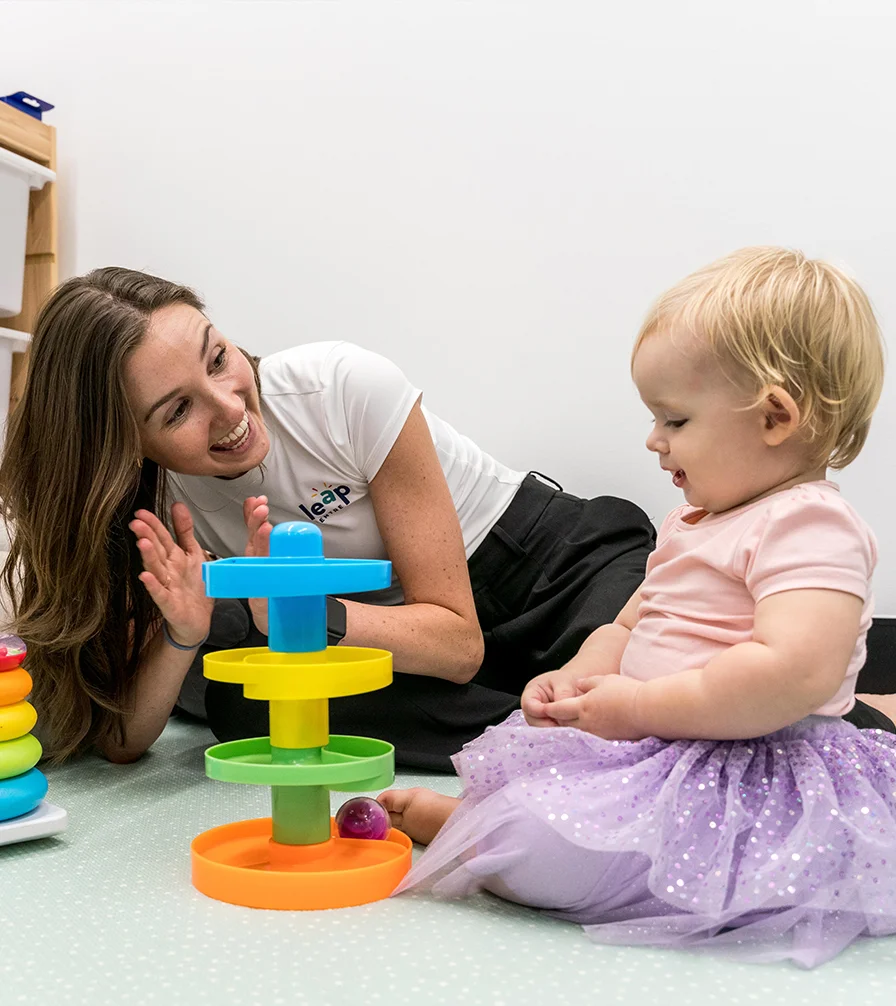
Home / Our Therapies / Speech Therapy / Paediatric Speech Therapy / Language Therapy

Our Language Therapy services cater to children with challenges in understanding and using language. This includes difficulty with comprehension, vocabulary development, sentence construction, and conversational skills. Our comprehensive assessment identifies specific language deficits and informs a personalised therapy plan. We use a combination of direct instruction and naturalistic learning opportunities to develop language skills in a context that makes sense for each child.
We also address social language use, helping children understand the nuances of conversation, such as taking turns in talking, understanding jokes, and interpreting non-literal language. In addition to individual therapy, we offer group sessions where children can practice language skills in a social setting. Our therapists collaborate with parents and teachers to ensure that language skills are supported across all environments, facilitating a more integrated and effective approach to language learning.
Language therapy plays a crucial role in supporting individuals with communication difficulties, focusing on enhancing various aspects of language, including receptive language, expressive language, and pragmatics. This comprehensive approach ensures that individuals can understand others, express themselves effectively, and use language appropriately in social contexts. Here, we delve into each of these components, illustrating how language therapy can facilitate better communication skills and improve overall quality of life.
Receptive language refers to the ability to understand and process the language we hear and read. It is foundational for effective communication, as it enables individuals to comprehend instructions, follow conversations, and absorb information from their environment. Difficulties with receptive language can manifest as challenges in understanding spoken words, following directions, or grasping complex grammatical structures.
Language therapy for receptive language aims to enhance an individual’s ability to decode and understand language. Our therapists employ various strategies, such as using visual aids, simplifying language, and practising listening skills, to improve comprehension. Activities may include games that require following instructions, storytelling to identify key details, and exercises to build vocabulary and understand concepts.
Expressive language is the ability to convey thoughts, ideas, and feelings through speech, writing, and nonverbal communication. Challenges in expressive language may appear as limited vocabulary, difficulties forming complete sentences, or struggling to express needs and ideas clearly.
Therapy for expressive language focuses on expanding vocabulary, improving sentence structure, and enhancing overall communication effectiveness. Therapists might use picture descriptions, role-playing, and storytelling exercises to encourage more complex sentence construction and clearer expression of thoughts and emotions. Technology, such as speech-generating devices, may also support individuals with severe expressive language difficulties, providing them with alternative means to communicate.
Pragmatics involves the use of language in social contexts, encompassing skills such as taking turns in conversation, understanding nonliteral language (e.g., idioms, sarcasm), and using appropriate language for different situations. Challenges in pragmatics can lead to misunderstandings, difficulty making friends, and social isolation.
Language therapy targeting pragmatics seeks to improve social communication skills. Therapists might use role-playing to practise conversation skills, teach strategies for interpreting nonliteral language, and provide guidance on understanding social cues and norms. Activities could include group therapy sessions to practise social interactions, scenarios to understand appropriate language use in various settings, and video modelling to demonstrate and practise social skills.
Language therapy, encompassing work on receptive language, expressive language, and/or pragmatics, is tailored to meet the individual needs of each person. By addressing these aspects comprehensively, therapists can support individuals in overcoming communication barriers, leading to improved interpersonal relationships, academic success, and greater participation in community life.
A collaborative approach, involving therapists, families, educators, and other professionals, is essential in language therapy. This multidisciplinary effort ensures that language goals are integrated across environments, providing consistent support and reinforcement. Family members and educators play a crucial role in this process, implementing strategies and activities in daily interactions that complement the therapeutic goals.
Early intervention is vital in language therapy, particularly for young children showing signs of language delays or disorders. Early identification and support can significantly impact a child’s language development, social skills, and academic achievements. Tailored interventions in the early years can lay a strong foundation for effective communication skills, fostering long-term success in personal and educational endeavours.
Language therapy is a powerful tool in addressing the complexities of communication disorders, offering hope and practical solutions for those facing challenges in receptive language, expressive language, and/or pragmatics. Through personalised therapy plans, a collaborative approach, and a focus on early intervention, individuals can achieve significant improvements in their ability to communicate, ultimately enhancing their participation in social, academic, and professional settings. By assisting children in mastering the basics of language and enhancing their communication skills, language therapy provides the essential keys to unlocking their full potential, enabling them to connect with and actively participate in the world around them.
We offer a comprehensive range of therapy services, including occupational therapy, speech therapy, and physiotherapy. Each service is tailored to meet the unique needs of our clients, ranging from developmental therapies for children to rehabilitation and support for adults. We also offer programs such as group sessions, individual sessions, and intensive therapy blocks.
If you or your family member is facing challenges with speech, mobility, daily activities, or other areas of physical and cognitive function, therapy might be beneficial. We recommend scheduling a consultation with our specialists for a professional assessment and personalised recommendations. Please submit your enquiry form to book the consultation.
Our clinic provides services for all age groups. We have specialised programs for children, adolescents, adults, and the elderly, ensuring age-appropriate and effective therapy for every client.
Therapy sessions are scheduled based on the individual needs and availability of our clients. Each session typically consists of 45 minutes of direct therapy followed by client/family feedback and therapist documentation/planning.
Yes, we actively collaborate with schools, physicians, and other healthcare providers to ensure a comprehensive and coordinated approach to our clients’ care. This multidisciplinary collaboration is essential for holistic treatment planning and effective outcomes. Contact us to collaborate with us!
Our approach is client-centered, evidence-based, and holistic. We focus on understanding each client’s unique needs and goals, and we tailor our therapy plans accordingly. We emphasise a collaborative approach involving the client, their family, and other professionals as needed.
We accept NDIS funding, private health, medicare, and private pay. For all NDIS self-managed or private paying clients, payment is required on the day of your session. Our administrative team can assist you in understanding your benefits and navigating the billing process. Give us a call or submit an enquiry form to find out more!
Yes we do! In addition to clinic-based sessions, we also offer therapy in the home, daycare settings, or at schools. Sessions outside of the clinic incur a travel fee consistent with the NDIS travel rate guide. Give us a call or submit an enquiry form to find out more!
We welcome and value your feedback. You can provide feedback directly to your therapist, through our reception, or by emailing info@leaptherapies.com.au. We are committed to continuous improvement and take your insights seriously.
Absolutely. We understand the importance of a good therapist-client match and will facilitate a change if needed to ensure the best therapeutic experience and outcome.
Getting started is easy. Simply contact us via phone, email, or our website to schedule an initial consultation. During this session, we will discuss your needs and create a personalised therapy plan.

"*" indicates required fields
Our dedicated team provides holistic occupational therapy, speech therapy, and physiotherapy, tailored to meet the unique needs of each individual.